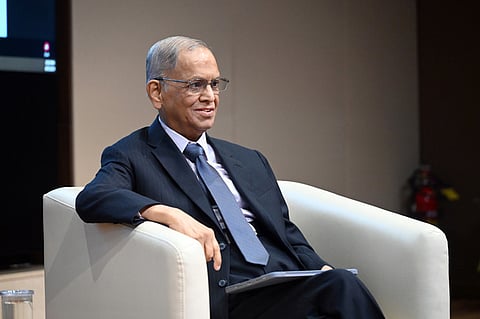

BENGALURU: Physics is not just for the best and brightest—it is for everyone, and it is time to make every student feel that way, Professor Paul G. Hewitt, internationally acclaimed author and physicist, said, urging teachers to transform their classrooms into vibrant spaces where physics becomes subject to dive into, not just get through.
Professor Hewitt was speaking during the launch of Conceptual Physics at the Infosys Science Foundation, during which Pearson India launched the 13th edition of the book for the first time in India.
During the event, Infosys founder Narayana Murthy called for the widely acclaimed Conceptual Physics by Professor Hewitt to be translated into Hindi, Kannada, and other regional languages, highlighting its potential to inspire India’s next generation of scientists. Murthy emphasised that making the book accessible in Indian languages would empower more students to grasp the fundamentals of physics, a critical pillar in achieving the nation’s goal of ‘Viksit Bharat’—a developed India by 2047.
Murthy highlighted the importance of the book Conceptual Physics by Professor Hewitt, calling it an essential resource for every high school student in India. Quoting the author, Murthy noted, "You cannot enjoy a game unless you know its rules. Likewise, you cannot fully appreciate your surroundings until you understand the rules of nature." He stressed that understanding these rules not only enhances one's view of the physical world but also equips students to contribute innovative solutions to global challenges.
Murthy underscored that the Prime Minister's vision for a developed India heavily relies on the scientific and technological capabilities of today's youth, aged 12 to 16. He stated that a deep understanding of physics is vital for nurturing critical thinking, problem-solving skills, and curiosity in students. Drawing parallels with historical scientific pioneers like Aryabhatta, Newton, and Einstein, Murthy said that developing these skills is crucial for India’s progress and technological advancement.
Conceptual Physics introduces students to the scientific method in a simple, engaging way, breaking down complex ideas into relatable examples from everyday life, such as measuring the size of the Earth, Moon, and Sun or understanding how magnetically levitated trains work. The book encourages students to think, discuss, and solve, promoting a hands-on approach to learning physics that goes beyond memorisation, Narayana Murthy said.
Highlighting the importance of making physics accessible and enjoyable for every student and not just the top achievers, Professor Hewitt emphasised that teaching physics should be about lifting students, helping them feel included, and making the subject relevant to their everyday lives. He urged teachers to create an inclusive environment where even the most hesitant students feel capable and valued—from the brightest to those struggling to find their way.
Professor Hewitt highlighted that the latest edition of the textbook emphasises this approach, with more “check questions” after each section to ensure students grasp key concepts as they go. This method aims to replace traditional lecturing with active, student-centred learning, making physics a subject that excites and engages all students, he said.